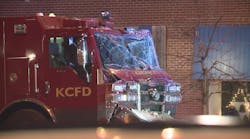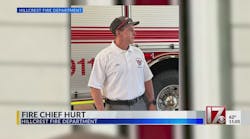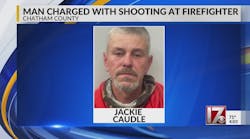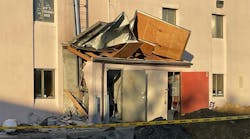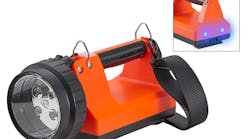Please stick with me and don't wander off; it will be worth your time. It may also help you get another "brother or sister" to get it. And as far as your family, if they read this, they will know more about what we do right -- and not always right -- and your son, daughter, mom, dad, wife, husband, boyfriend, girlfriend or whoever "is in your wallet" will probably nag you even more. They will nag you even more about driving carefully, slowing down, running red lights and stop signs only when it is fully clear, wearing all of your protective clothing and other nagging related to not getting yourself killed unnecessarily.
So often as firefighters we don't give much thought to ourselves or how our actions will impact us as individuals. That's probably due to some psychological issue that makes us firefighters. It's the "good qualify" of each of you that makes you put danger aside in order to help someone else. And that's a good thing. Almost always. But not always. Sometimes, we go out of our way to help others and we don't think about the consequences of our actions or how it may negatively impact us. Sometimes, it is heroic and necessary. Sometimes it is unnecessary. The line is between us taken actions that probably will matter vs. us taking actions on what probably will not matter.
For a quick example, let's just say that you arrive at a fully involved (fully involved means fire everywhere, otherwise it is not fully involved) dwelling fire. No matter how bad you may feel or how angry you may get, when the chief says you and your crew are not going in -- you are not going in. No vote. No opinion from you needed. This will be an exterior operation. Going into that building would be an action that will not matter -- and will place you very high on the "very stupid actions" meter. Actually, the needle on that meter just fell off.
On the other hand, if you and your crew arrive at a working fire in that same dwelling with some fire and lots of smoke, a "working fire", with indications of persons possibly being inside (time of day, cars in driveway, garage or some even more obvious indicators such as someone telling you people are trapped), the chief will probably be ordering you and your crew in to that building to vent, search, attack, rescue etc. Taking those actions probably will matter. Or at least you had decent information that the incident commander felt it was worth your life being risked.
We are in a risky business and we will never eliminate all the risk. But there are some things we can be doing differently to lower the risk. The two top ways we die in the line of duty are heart attack/stroke and that is followed by vehicle-related incidents such as crashes involving apparatus or personal vehicles. And the vehicle issue is what we'll cover this month.
I want to introduce you (in this column) to Assistant Chief Robert Leslie of the Coal City, IN, Fire Department:
Dear Firehouse® Magazine Close Calls readers: I am Robert Leslie and I am a volunteer firefighter. I am writing this story to let the whole fire community know just how your life can change at a drop of a hat, whether you think it will or not.
I have had a great marriage to my wife Dennise for 10½ years and would not trade it for anything in the world. I have two stepsons that I call my own. One is 21 and married and the other is just now 15 and living with me.
July 2, 2007 was just another day in our lives. I work construction and got up and went to work at 5 A.M. My wife did child care at home, but the children that she watched had doctor appointments, so she was free that day. I always called my wife on my way home to discuss our day and what we were having for supper and little things like that. Probably not any different than any of you reading this. I called as I always did and we talked for about 30 minutes. After that, I headed home looking forward to seeing her and the family.
When I got home, my son Chris told me that Mom had just left on a fire call. She too was a volunteer firefighter. We are a very small fire department and I knew that we were shorthanded at that time of the day, so I got back in the car with a radio and responded. As I was on my way, about two miles down the road, our tones activated for an auto crash on the same road I was traveling on, on my way to the station. I am an EMS first responder, so I responded to the crash. Upon my arrival, I found that it was not only a crash, but my wife was involved.
At first I was in shock and I kept saying "it's my wife," "it's my wife" over and over and over. I jumped out and knew it was going to be a bad crash by the condition of her truck. I climbed over the hood to check for vitals on my wife, because the top of the cab was in the bed of the truck. There were no vitals to be found.
My wife had topped a hill on a narrow road and met a car turning into its driveway. She swerved to miss them head-on and succeeded in doing so. Unfortunately, she lost control of her truck and then overcorrected and hit an embankment, flipping the truck on the side and going airborne into a large tree on the other side of a driveway. The truck struck the tree head-on in the air and on its side. Contact was made about six inches from the base of the windshield and removed the entire top of the truck and placed it in the bed. The truck was a 2000 Ford Ranger. Airbags deployed, but the tree struck my wife. The police report says that there were no restraints, but my son was a witness of her buckling on her seatbelt. She died on impact and felt nothing.
In another twist of a tragic situation, this was her first solo run since becoming a certified firefighter -- she was just going to help. She had always rode shotgun with me on every run, but this was her first run to take in on her own.
My wife had a large laceration to her left cranial cavity and her skull was crushed from the tree and windshield. Her chest was also crushed from the seatbelt being torn off and the B-post being pushed back to the bed. Knowing my wife as well as I do and by the police report, speed was not an issue in the crash.
Brothers and sisters: I have been in the fire service for about eight years and a first responder for 2½. I also belong to Owen County Rescue and Owen County Rope and Water Rescue. I am currently the second assistant fire chief at Coal City Volunteer Fire Department. I have always made it a standing rule in my home that no one is to get hurt badly but me. Unfortunately, that wasn't the case that horrific day.
My wife got involved in the fire service about a year and a half ago and overcame significant obstacles to become a firefighter. She was severely claustrophobic, so getting in an SCBA was challenge in itself and having me as her SCBA trainer was no help at all! Believe it or not, she spent many nights at home watching TV with an SCBA mask held to her face to help her get used to it -- and eventually passed her training! My wife was very active at the fire station, serving as president and secretary as well as writing as many grants as she could for the station and the community.
This loss of mine was as large as it could possibly be and I believe that God had a more important use for my wife or He would not have taken her so soon from this world. Dennise had battled cancer and won: she was also on Owen County Rescue and Owen County Rope and Water Rescue with me. We did nothing without each other; we also served as foster parents.
I love my wife Dennise and always will and I cherish the time the good Lord gave me with her. I guess what I am trying to tell anyone that reads this is cherish what you have because it could be gone in less than a second. As for me, I am very protective of my family and being first on scene let me protect my wife for the last time. I secured the scene until EMS arrived and turned it over to my brothers and sisters. The fire service and my brothers and sisters of fire service have been my backbone. Knowing that there are so many of you out there that have my back has given me the strength to push forward in life and to share my story with you. My wife loved to help people and I do too, so please remember it can happen to you at any time without warning. I love each and every one of you and hope that reading this might keep this from happening to you or a fellow firefighter. Be safe and God bless all of you and your families.
These comments are based on Chief Goldfeder's observations and communications with the writer and others regarding this tragic line-of-duty death:
Off-station firefighters (recalled career, volunteer, part-time or call firefighters) responding to the station and losing their lives in the process are among the highest numbers of non-medical related line-of-duty deaths annually.
I spent time talking with Chief Leslie about his wife Dennise and, of course, this incident. The road design was very tight and there apparently was nowhere else for her to go. While she was traveling the speed limit, according to the police, and their son says that when she left the house she did have her seatbelt on, she still lost her life. The speed limit matters little when a car crosses in your path -- responding or not. And the ability to "stop safely right now" is something that we have to constantly think about when driving. When you are responding to an emergency call, we have to really want to arrive while expecting "anything" to happen while we are driving. Our ability to expect that and safely react to that determines whether we arrive or not.
While her son states that he saw his mom buckle up as she left the house and she has a solid history of always belting up, the police wrote it up as she was unrestrained. In speaking with the chief, because of the mechanism of the crash, the seatbelt, B-post and other parts of the car completely separated as described above and the investigation was unable to reveal whether the belt was secure. Our condolences to Chief Leslie and his family as well as the members of the Coal City Volunteer Fire Department.
As we know, while all firefighters lead heroic lives, sadly, the majority of our line-of-duty deaths are not due to heroic circumstances. Should we die? Sometimes. Sometimes, firefighters do die -- and the loss, while tragic, is justifiable and heroic. When firefighters are doing what they are trained to do -- attempting a search, a rescue or other genuine life-saving tasks -- and tragically lose their lives, sometimes it is justifiable and heroic. We are in a risky business and sometimes we have to give up our lives in order to save others, as in the examples of Foreman Kevin Apuzzio from East Franklin, NJ, and Lieutenant Howie Carpluk from FDNY last year. It's the unjustified, often-predictable and avoidable line-of-duty deaths that are causing the problem, not the heroic ones.
At the risk of oversimplifying the issue, here are "12 Steps" to seriously minimize close calls, injuries and line-of-duty deaths at your fire department:
- If we recruit, hire and promote the best possible people with strict and tough hiring standards and very tough and certifiable training...
- If we operate and train to proven standards and modern firefighting practices...
- If we wear all our personal protective equipment (PPE) without excuse, head to toe with no exposed skin and no longer breathe poison...
- If we send the correct amount of firefighters on the first alarm (based on pre-plans and what's reported)...
- If we promote fire officers who are highly motivated, gung-ho and educated as well as highly trained, skilled and understand that they must enforce the SOPs as supervisors...
- If we train on and understand building construction and fire behavior...
- If we use the incident command system (ICS) with strict and respected command, control and accountability on the fireground...
- If we slow down "expecting something to go wrong," drive smart, always wear seatbelts and never blow red traffic lights or stop signs without stopping first...
- If we pull the right-size hoselines with the needed water and control the fire as quickly as possible...
- If we understand when it is worth risking our firefighters' lives and when it is not (risk versus benefit)...
- If we develop strict fire-safe building codes and mandatory fire sprinkler systems...
- If we especially understand the issues related to firefighter health, diet, wellness and fitness, we can probably reduce firefighter line-of-duty deaths by 75% or so.
And although all the national and federally funded "LODD reduction" programs are excellent tools, until the chiefs at the fire department, the officer in the front seat, the firefighters who drive and the firefighters riding backwards want this to change, on their apparatus and on their fireground, not much else will matter or change. And until off-duty, call, recall or volunteer firefighters responding from home or work slow down, buckle up and do what the laws state, we will not see a change.
While the close call issues and how to avoid them should be clear, one more reason to avoid doing some of the un-needed things we do to get hurt or killed is in your wallet. Take a look at the pictures of those in your wallet, on your desk or wherever. Now think about those firefighters who died heroically in 2007 as well as those who did not have to die -- and the people in their wallets.
